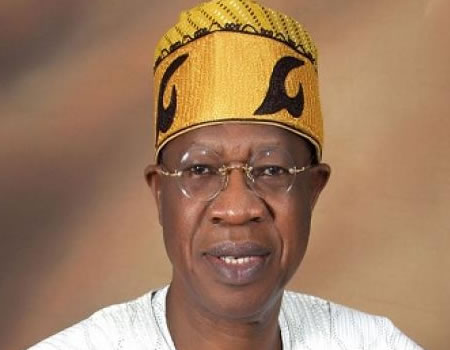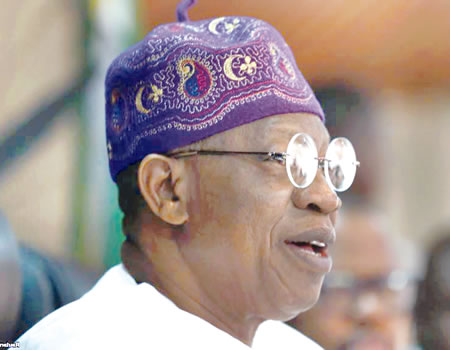THOUGH it did not fare too badly in the overall scheme of things, the inaction in the last quarter of the year made people wonder where the energy displayed earlier disappeared to.
Early in January, the ministry supported the Centre for Black Culture and International Understanding (CBCIU), for the long overdue 50th anniversary of the Osogbo Artists’ Movement. The works of master artists including Jimoh Buraimoh, Taiwo Olaniyi (Twins Seven-Seven), Muraina Oyelami, Adebisi Fabunmi, Rufus Ogundele and Jacob Afolabi were displayed in exhibitions in Osogbo and Abuja.
It followed through in July with a parley with the private sector on how to wean Nigeria’s economy off oil and make the creative industry the economy’s mainstay. The creative industry, Minister Lai Mohammed explained at the well-attended roundtable, must be transformed into a creative economy as a matter of necessity.
He said: “This administration has no doubt that the plan to transform the creative industry to a creative economy must be driven by the private sector. It is self-evident that the modest growth that has been achieved in the creative industry so far, whether in films, music or fashion, has been achieved in spite of the government. It, therefore, stands to reason that with the government providing the necessary enabling environment and the private sector in the driver’s seat, the transformation can be realized within a short time.”
Days after that parley, the maiden Creative Nigeria Summit with the theme Financing the Film, Television and Music Industries happened in Lagos. Crucially, important gains were made at the conference, where the Minister of Finance, Mrs. Kemi Adeosun represented Vice-President Yemi Osinbajo.
Adeosun declared at the event: “The creativity that you have demonstrated in a sector government doesn’t fund is incredible. For you to go to the next level, there’s a need for more… One of the things we are to address is direct government funding. The government will provide tax relief for those who are ready to venture into the creative industry. We will look at a situation where we can create a pool of financing for the industry.”
By August, the Yewande Sadiku-led Nigerian Investment Promotion Commission included the creative sector among 27 new industries granted tax reliefs.
In August, Mohammed led some players in the creative industry to make a presentation to the Central Bank of Nigeria (CBN) Governor, Godwin Emefiele, on the challenges and prospects of the creative industry. They requested the CBN to float a N400 billion Stimulus Capital Fund for their vastly improving industry.
Emefiele promised to look into their request, advising that they form clusters and work with the CBN’s Development Finance Department to make it easier for them to structure bankable proposals that will attract funding.
Prior to visiting Emefiele, the minister had gone to see the Inspector General of Police, Ibrahim Idris, who consented to the establishment of Anti-Piracy Units in all police commands and the Federal Capital Territory to fight the most virulent cancer afflicting the creative industry.
Thereafter, the ministry and most of its parastatals appeared to run out of steam. The National Troupe of Nigeria, which used to hold regular performances to mark public events, has been comatose since the appointment of Comrade Tar Ukoh as its head and that of the National Theatre. Curiously, Ukoh administers the two bodies remotely from Abuja, where he is based. Some say this is why the National Theatre has been without power for well over five months with staff morale at its lowest.
The 40th anniversary of FESTAC ’77 which the Centre for Black African Art and Civilisation (CBAAC) organised could have been better packaged but redemption came through the National Council for Arts and Culture (NCAC), headed by Otunba Olusegun Runsewe. In spite of extreme financial constraints, Runsewe organised a vastly improved African Arts and Crafts Expo and followed that up with a colorful National Festival of Arts in Kaduna in November. Given his antecedent as a past Director General of the Abuja Carnival, Runsewe, perhaps, could have been tasked with organising the 2017 Abuja Carnival. That the carnival didn’t happen this year is a shame.
But while the ministry expected to give direction to the creative industry is ending the year on a whimper, the private sector, characteristically, excelled.
The theatre, a vital component of that Industry, continues to sparkle with an array of traditional plays, musicals, and dances while there were also significant film releases. The visual arts scene also bubbled with the second edition of Art-X and the maiden Lagos Biennale, apart from other important exhibitions and auctions.
Sadly, there is no escaping the fact that the private sector is also feeling the economic pinch with just one major production, Fela and the Kalakuta Queens running since yuletide into the New Year.
But as we welcome the New Year, it is hoped that the Ministry will rediscover its vibe and get cracking.







